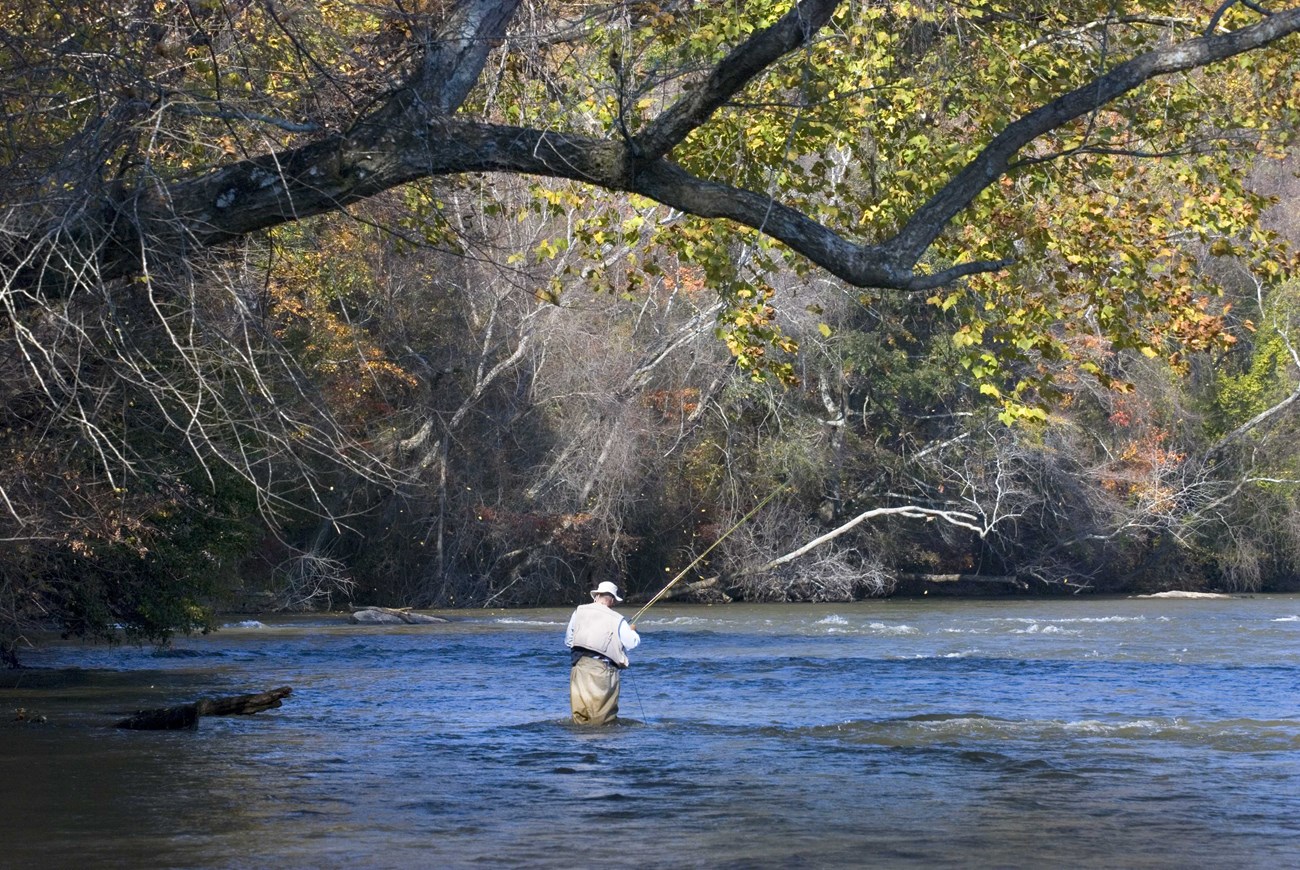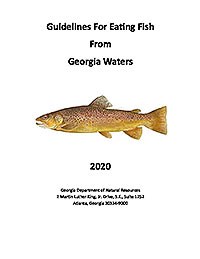
NPS VIP / Tom Wilson Fishing the Chattahoochee River year-round for its trout, bass, catfish, and other species can be a great experience. The river stays a cool temperature year-round, rarely getting warmer than 50 degrees Fahrenheit. The river within the park is open for fishing from 30 minutes before sunrise until 30 minutes after sunset. Night fishing is not permitted in the park. Anglers need to follow Georgia fishing regulations. A valid Georgia fishing license is required for anglers age 16 and older. Additionally, all resident anglers ages 16 to 64 and nonresident anglers age 16 or older must have a trout stamp. Visit the Georgia Department of Natural Resources website for more information about fishing license. Since the Chattahoochee River is a designated trout stream from Buford Dam to the mouth of Peachtree Creek, including Bull Sluice Lake, special trout regulations apply. The use of live bait-fish in the river is prohibited within the park. Seining the river for bait-fish is also prohibited within the park. Anglers must fish with only one rod per person. Anglers are also required to possess a trout stamp even if they are fishing for other species. Learn all about fishing regulations from the Georgia Department of Natural Resources website. LicensesGeorgia law requires anglers age 16 and older to have a current Georgia fishing license in their possession while fishing in the Chattahoochee River, Island Ford Pond, and Sibley Pond. Additionally, all resident anglers ages 16 to 64 and nonresident anglers age 16 or older must have a trout stamp to fish in the Chattahoochee River. Licenses may be purchased online, in person at participating locations, or by phone. Your purchase supports the conservation of Georgia's aquatic resources. Visit the Georgia Department of Natural Resources website for aditional information. General Fishing RegulationsAnglers must follow the appropriate Georgia general regulations while fishing. Make sure you know what the daily limit is for the species of fish you're planning to catch. The Chattahoochee River from Buford Dam to the mouth of Peachtree Creek, including Bull Sluice Lake, is a designated trout stream where special trout regulations apply. Trout Season
Fishing Hours
Trout Fishing Rules
Delayed Harvest RegulationsDelayed Harvest Regulations apply to Chattahoochee River from Sope Creek (off Columns Drive) downstream to US Hwy 41 (Cobb Parkway) from November 1 to May 14 annually.
Artificial Lures OnlyOnly artificial lures may be used on the Chattahoochee River from GA Hwy 20 to the Medlock Bridge Unit boat ramp immediately upstream of GA Hwy 141. It is unlawful to possess any other type bait on an “artificial lures only” stream

Fish Consumption AdvisoriesThe Georgia Department of Natural Resources provides advice on fish and shellfish caught in the waters in their jurisdiction to help people make informed decisions about eating fish. Advisories are recommendations to limit your consumption of, or avoid eating entirely, certain species of fish or shellfish from specific bodies of water due to chemical or biological contamination. Fish is part of a healthy balanced diet, but eating wild fish and shellfish caught in park waters is not risk free. Parks are “islands”, but the much larger “ocean” that surrounds them affects the natural resources inside a park. Other aquatic toxins are the result of natural biological processes. Also, chemical contaminants that originate outside of park boundaries can come into parks. Two contaminants, polychlorinated biphenyls (PCBs), and mercury, were frequently detected in significant amounts in a few species from the Chattahoochee River. Below Morgan Falls Dam Common Carp were found to be contaminated with low concentrations of PCBs. It is now illegal to manufacture PCBs; however, in the past, these synthetic oils were used regularly as fluids for electrical transformers, cutting oils, and carbonless paper. Although they were banned in 1976, they do not break down easily and remain in aquatic sediments for years. Over time, levels of PCBs are decreasing. Between Buford Dam and Morgan Falls Dam Largemouth Bass and below Morgan Falls Dam Jumprock Sucker were found to be contaminated with mercury. Mercury is a naturally occurring metal that does not break down as it cycles between land, water, and air. As mercury cycles through the environment it is absorbed and ingested by plants and animals. Nearly all of the mercury found in fish flesh is an organic form, called methylmercury. Most of the mercury absorbed or ingested will be returned to the environment but some will remain in the plant and animal tissues. It is not known where the mercury in Georgia’s fish originated. Mercury may be present in fish because of the mercury content of soils and rocks in the southeast, from municipal and industrial sources, or from fossil fuel use. Scientific evidence is growing that mercury is transported long distances through the upper atmosphere, making its control a global environmental issue. Although mercury has always been present, scientific research shows that the amount of mercury cycling through the environment has increased significantly following the dawn of the Industrial Revolution in the late 1800s. Chattahoochee River National Recreation Area Fish Consumption GuidelinesView the Georgia Department of Natural Resources Field Consumtion Guidelines web page for additional information about chemical contaminates found in the Chattahoochee River and many other lakes and rivers in Georgia.
Aquatic Invasive SpeciesImagine your favorite fishing spot and the wonderful memories. Things may look fine but underneath the surface there is a serious threat. Everything you remembered is now cemented together in a sharp, smelly mess. Invaders have wiped out the fish species you used to catch. Aquatic invasive species are not native to an ecosystem. Their introduction causes, or is likely to cause, harm to the economy, the environment, or to human health. Aquatic invasive species are a growing risk to parks and their values. In the United States alone, there are more than 250 non-native aquatic species. For many centuries, humans have contributed to spreading non-native species around the globe. You can make a difference. To learn more about Aquatic Invasive Species in the National Park Service, visit the Fish & Fishing website. How You Can Help – Stop Aquatic HitchhikersFishing Throughout the National Park ServiceWe invite you to visit the Fish and Fishing website for more information about fish and fishing in the National Park Service. You will learn about conservation, different fish species, and parks that offer fishing. | ||||||||||||||||||||
Last updated: April 15, 2021
